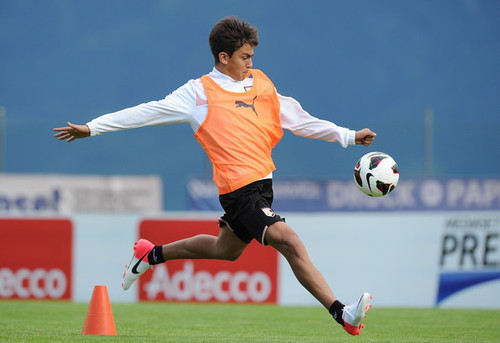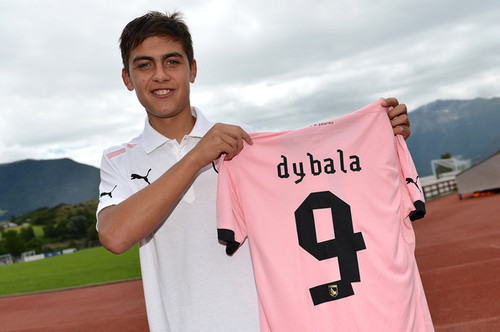An Argentinian ‘Jewel’ raring to ignite the Serie A for Palermo, Paulo Dybala has arrived!
An Argentinian ‘Jewel’ raring to ignite the Serie A for Palermo, Paulo Dybala has arrived!


Paulo Dybala is a footballing Jimmy McNulty. If you are unfamiliar with the HBO series The Wire, the McNulty character is a detective who just happens to have an ingrained talent for what he does. He is possessed of an instinct that sets him apart from the rest of the knuckleheads around him. Natural police.
Likewise, Dybala is a natural footballer. The new Palermo signing is able to count on instincts on the pitch that cannot be taught in any academy, or even through years of experience at the top level. Even at the tender age of 18, Dybala’s vision, his finishing ability and his movements on and off the ball, smack of a virtuosity that only certain athletes are blessed with.
It was for that reason that so many European clubs were chasing the signature of a teenager who had never even played in Argentina’s top flight. He spent his only season as a senior footballer with Instituto in the Nacional B, Argentina’s second division. He may not be a great player yet, but his potential to become one is clear. Dybala’s nickname of ‘La Joya’ (The Jewel) is an appropriate one. He is likely to be very valuable one day.
Born in the town of Laguna Larga, population 7000, about half an hour’s drive from the city of Córdoba, Dybala played for local teams until the age of 10, when he began to travel in to the provincial capital to train with Instituto de Córdoba’s youth teams. At the age of 15, Paulo’s father passed away. He took the decision to move permanently to the city, board at the club and pursue a professional career. Within two years he was playing for the senior team.
One of his junior coaches, Francisco Buteler, described to the newspaper La Mañana how Dybala was utilised as a playmaker before an injury kept him out for a month. Upon his return, he slotted in to the ‘number 9’ role and excelled. It was as a striker that he rapidly worked his way up through the junior teams to eventually break into the first team. Buteler knew the player was a special talent from the start.
“In the 15 years I’ve been working with youth teams he is the most outstanding player I have seen; he has all the attributes of a complete player,” he said. “He is skilful, has the ability to lose two opponents with one move, he has a very good shot and great vision. In the position he is now he is a goal-getter. He wanted to play as enganche (playmaker), we convinced him [to become a striker], he was called up to the first team, and now he is reaping the rewards. He is a very humble kid.”
After making his debut for Instituto on August 12, 2011 at the age of 17, Dybala set about breaking various club records, many of which had been held by legendary figure Mario Kempes. Though he only managed 40 games before being snapped up by Palermo, La Joya was able to net 17 times. He pipped Kempes to become the youngest scorer for the club and the youngest to play 38 consecutive games for any team. He was also the first Instituto player to score two hat-tricks in a single season and managed to net in six straight games, beating the previous record of four (held by Kempes, among others).
Dybala’s goals dried up in the second half of the season, at almost the precise moment his move to Palermo became a near-certainty. At the same time, Instituto, who had been a permanent fixture at or near the top of the Nacional B standings, dropped away as well; so much so that the team missed out on a promotion that had looked a certainty for much of the campaign. It is difficult to tell whether Dybala’s dip in form was caused by Instituto’s relatively poor run, or vice versa. At the same time it is worth noting that the young prospect was frequently used in his old position of enganche in the latter part of the season, so his main function was no longer to find the net himself.
Though Dybala has only had the opportunity to show off his qualities in a second-rung competition, it is clear why Palermo and other big clubs like Internazionale and Benfica were chasing his signature. The natural instincts mentioned above combined with a varied skillset would indicate he will be able to adapt to top European competition.

Palermo president Walter Zamparini, a man known for his measured, understated public pronouncements (ahem), announced the signing of the Instituto star by calling him the new Sergio Agüero. Indeed, the Kun comparison has been uttered more than a few times in Argentina as well. Obviously it is unfair on the Palermo player to be compared to one of the top five strikers in world football, but there are certain similarities that jump out. Like Agüero, Dybala is a goal-sneak with the vision and passing ability to also be able to drop back and link up the attacking play. This net-finding reflex combined with a whole array of other skills is what makes him so sought after.
Dybala is quick off the ball and an agile dribbler. Instituto at their best last season hurt opponents with fast, precise build up play involving one-touch passing and intelligent movement, and Dybala was usually at the heart of the action. He has the ability to astutely change the direction of an attacking surge either through smart passing or by darting off on angled runs. He is then regularly available in the box to finish off the movement as well. He favours his left foot, but is adept with both and has a decent aerial presence despite being fairly small at 1.77m.
“I always try to keep it simple,” Dybala told La Mañana soon after breaking into the Instituto first team, “one or two touches and then I look for the return ball. And I also run to win the ball back. I would like to handle the set pieces as well, but that’s difficult at the moment,” said the teenager who points to Juan Sebastian Veron and Juan Roman Riquelme as his influences, hinting at his playmaking roots.
“My old man died when I was 15 and I’d like to have him here to enjoy what I am experiencing now, but I know he is helping me out from above,” Dybala said. “If it wasn’t for him, I wouldn’t be here, and I am very grateful, and to my mother as well, who has supported me a lot.”
No doubt Paulo’s old man would have been delighted at what his son has achieved already. And looking at the upward trajectory of this natural footballer from Córdoba’s career so far, it shouldn’t be long before there is much more to be proud of.
This is a guest article by Daniel Colasimone, an Australian journalist and editor of Argentina Football World. Comments below please.







